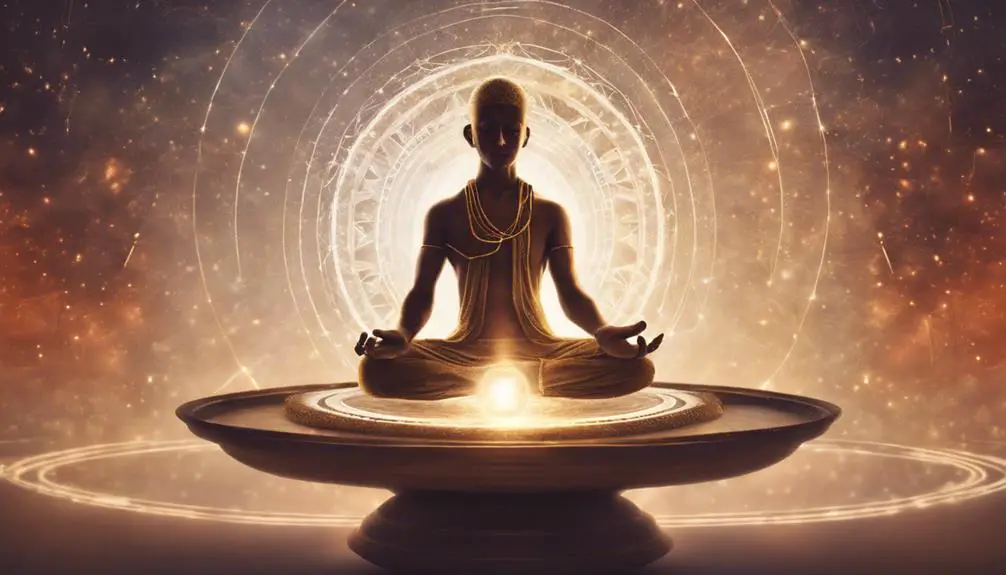This exploration of spirituality's place between sanctity and sin might just redefine your understanding of faith and morality.

Is Spirituality a Sin?
Navigating the waters of spirituality and sin can feel like sailing through a fog—where the lines between right and wrong blur. You've likely encountered various perspectives on whether embracing spirituality falls into the realm of sinfulness, especially when it steers away from traditional religious doctrines.
This discourse isn't just about pitting personal beliefs against established teachings; it's about understanding where spirituality fits in the complex mosaic of morality. As you ponder this, consider how major religions view the interplay between spirituality and sin, and why contemporary views might challenge or reinforce these perspectives.
The journey ahead promises to unveil nuances that could shift your standing point.
Key Takeaways
- Spirituality transcends specific religious doctrines, focusing on personal connection and growth rather than sin.
- Labeling spiritual practices as sins overlooks their complexity and the context in which they are practiced.
- Spiritual beliefs and practices contribute to ethical behavior, social justice, and community well-being, far from being sinful.
- Contemporary spirituality is diverse and personalized, not confined to traditional religious structures, challenging the notion of spirituality as sin.
Defining Spirituality and Sin

To adequately explore the question of whether spirituality is a sin, it's crucial to first clarify what we mean by 'spirituality' and 'sin.' Spirituality encompasses a broad range of beliefs and practices aimed at a deeper understanding or connection with the essence of being, transcendent realities, or a higher power. It's not confined to organized religion and can include meditation, prayer, and various forms of personal reflection and connection to the universe or divine.
Sin, on the other hand, originates from religious contexts and is traditionally understood as an act, thought, or way of being that goes against divine law or moral principles. The concept of sin varies significantly across different cultures and religious traditions, but it generally implies a moral failing or wrongdoing.
When you consider spiritual practices within this framework, the question of sinfulness becomes complex. Spiritual practices, by their nature, seek to transcend the ordinary and connect with something greater than oneself. The sinfulness of these practices, then, hinges on the intentions behind them and the moral or ethical frameworks they're situated within. Without understanding the specific context of a spiritual practice, labeling it as a sin oversimplifies its nature and disregards the diverse intentions and beliefs that guide individuals in their spiritual journeys.
Spirituality in Major Religions
Exploring the relationship between spirituality and major religions reveals a complex and nuanced interaction that varies widely across different faith traditions. While some view spirituality as an integral part of religious practice, others see it as a distinct path that may not necessarily align with traditional religious structures.
In this context, it's essential to consider:
- Spiritual practices: These can range from prayer and meditation to acts of compassion and service, showing that spirituality often transcends the boundaries of specific religious doctrines.
- Interfaith dialogues: Such discussions can bridge the gap between different religious beliefs, highlighting the universal aspects of spirituality that transcend individual faiths.
- Personal experience: The subjective nature of spirituality means that it can be deeply personal, allowing individuals to connect with the divine in ways that are meaningful to them, outside the confines of organized religion.
Understanding spirituality within the framework of major religions requires an appreciation of its multifaceted nature. It's a testament to the human quest for meaning, belonging, and connection to something greater than oneself. By engaging in spiritual practices and fostering interfaith dialogues, individuals can explore the depths of their beliefs and experiences, enriching their spiritual and religious lives.
The Moral Dimensions of Spirituality

Spirituality's moral dimensions challenge individuals to consider how their inner beliefs shape their actions and interactions in the world. You're invited to reflect on the ethical implications of your spiritual practices and how they influence not only your personal conduct but also your contributions to society. This exploration demands a rigorous examination of the principles guiding your spiritual journey and their alignment with broader societal values.
The societal impact of spirituality can't be overstated. Your spiritual beliefs often dictate your approach to social justice, environmental stewardship, and community engagement. They compel you to question how you can live a life that not only serves your individual purpose but also contributes positively to the world around you. This intersection of spirituality and morality beckons you to consider the broader consequences of your spiritual endeavors on societal well-being.
Moreover, the ethical implications of spirituality extend into the realm of interpersonal relationships. They influence how you navigate conflicts, practice empathy, and foster connections with others. Your spiritual beliefs set a foundation for ethical behavior, encouraging you to act with integrity and compassion in all facets of life. This deep intertwining of spirituality and morality underscores the importance of reflecting on how your spiritual practices shape your ethical landscape.
Personal Beliefs Vs. Religious Doctrine
While reflecting on the ethical landscape shaped by spiritual practices, it's crucial to examine the intricate dance between personal beliefs and religious doctrine. This interplay significantly affects your individual identity, often molding it in ways that reflect both personal convictions and the broader cultural influences surrounding you.
Personal beliefs serve as the bedrock of your spiritual and ethical worldview. They're deeply personal, usually evolving from a combination of introspection, experience, and the influence of those you hold in esteem. Religious doctrine, on the other hand, offers a collective wisdom that has been shaped and refined over generations, providing a framework within which individuals find meaning and direction.
The tension between these two can be a source of profound growth or conflict:
- Individual identity is continuously shaped and reshaped as you navigate through the complexities of aligning your personal beliefs with the doctrines of your faith.
- Cultural influences play a significant role, often dictating the degree of flexibility or rigidity in interpreting religious doctrines.
- The dynamic between personal beliefs and religious doctrine challenges you to critically evaluate and sometimes reconcile differences to forge a coherent sense of self and purpose.
Understanding this dynamic is essential for anyone navigating the complexities of faith in the modern world.
Contemporary Views on Spirituality

In recent years, spirituality has increasingly been viewed through a prism of diversity and personalization, reflecting a shift in societal attitudes and practices. You're now navigating a landscape where spiritual practices are not solely tethered to traditional religious institutions. Instead, they often blend or stand entirely apart from established doctrines, influenced by secular perspectives and a broader, more inclusive understanding of spirituality.
This evolving viewpoint acknowledges that spirituality can be deeply personal, varying significantly from one individual to another. It's not uncommon for someone to draw upon multiple sources in their spiritual journey, incorporating elements from various religions, philosophies, and even scientific understandings of the universe.
To give you a clearer picture, consider the following table, which outlines key aspects of contemporary views on spirituality:
Aspect |
Traditional View |
Contemporary View |
|---|---|---|
Source |
Religious texts |
Diverse, including personal experiences |
Practice |
Organized rituals |
Varied, personalized spiritual practices |
Authority |
Religious leaders |
Individual intuition |
Goal |
Salvation, enlightenment |
Personal growth, well-being |
This table highlights how contemporary spirituality often diverges from more traditional paths, emphasizing personal growth and well-being over adherence to a specific set of beliefs or rituals. It's a testament to the dynamic nature of spiritual understanding in today's world.
Frequently Asked Questions
How Does Adopting Spiritual Practices Impact Mental Health and Well-Being Outside of Religious Contexts?
Adopting spiritual practices can significantly boost your mental health and well-being. Mindfulness benefits include enhanced focus and clarity, while stress reduction is achieved through meditation, fostering a sense of peace and emotional balance.
Can Spirituality Lead to Social Isolation, and if So, Under What Circumstances?
Yes, spirituality can lead to social isolation if it causes you to neglect community bonds. However, in pursuing personal growth, you'll find that a balanced approach keeps you connected and enriched, not isolated.
Are There Any Legal Implications or Controversies Surrounding Certain Spiritual Practices in Various Countries?
Yes, certain spiritual practices face legal controversies in various countries, often clashing with cultural heritage. Legal reforms are needed to address these conflicts, ensuring practices align with human rights and societal norms.
How Does Spirituality Influence Decision-Making and Leadership Styles in Professional or Corporate Settings?
Spirituality often shapes how you navigate ethical dilemmas and apply various leadership theories in professional settings. It influences your decision-making and leadership style, potentially fostering a more empathetic and values-driven approach in the corporate world.
What Role Does Digital Media Play in the Spread and Evolution of New Spiritual Movements?
Digital media's role in spreading new spiritual movements hinges on digital literacy and content regulation. You'll find that as digital literacy rises, so does engagement with spiritual content, evolving movements through widespread, rapid dissemination.
Conclusion
In conclusion, the relationship between spirituality and sin is complex and varies widely across different religious traditions and personal beliefs.
While some may view certain spiritual practices as sinful, others see spirituality as a path to moral and ethical living.
It's crucial to analyze this interplay critically, considering the diverse perspectives and historical contexts.
Ultimately, the distinction between spirituality and sin is subjective, shaped by individual and cultural interpretations of religious doctrine and spiritual experience.



Sign up